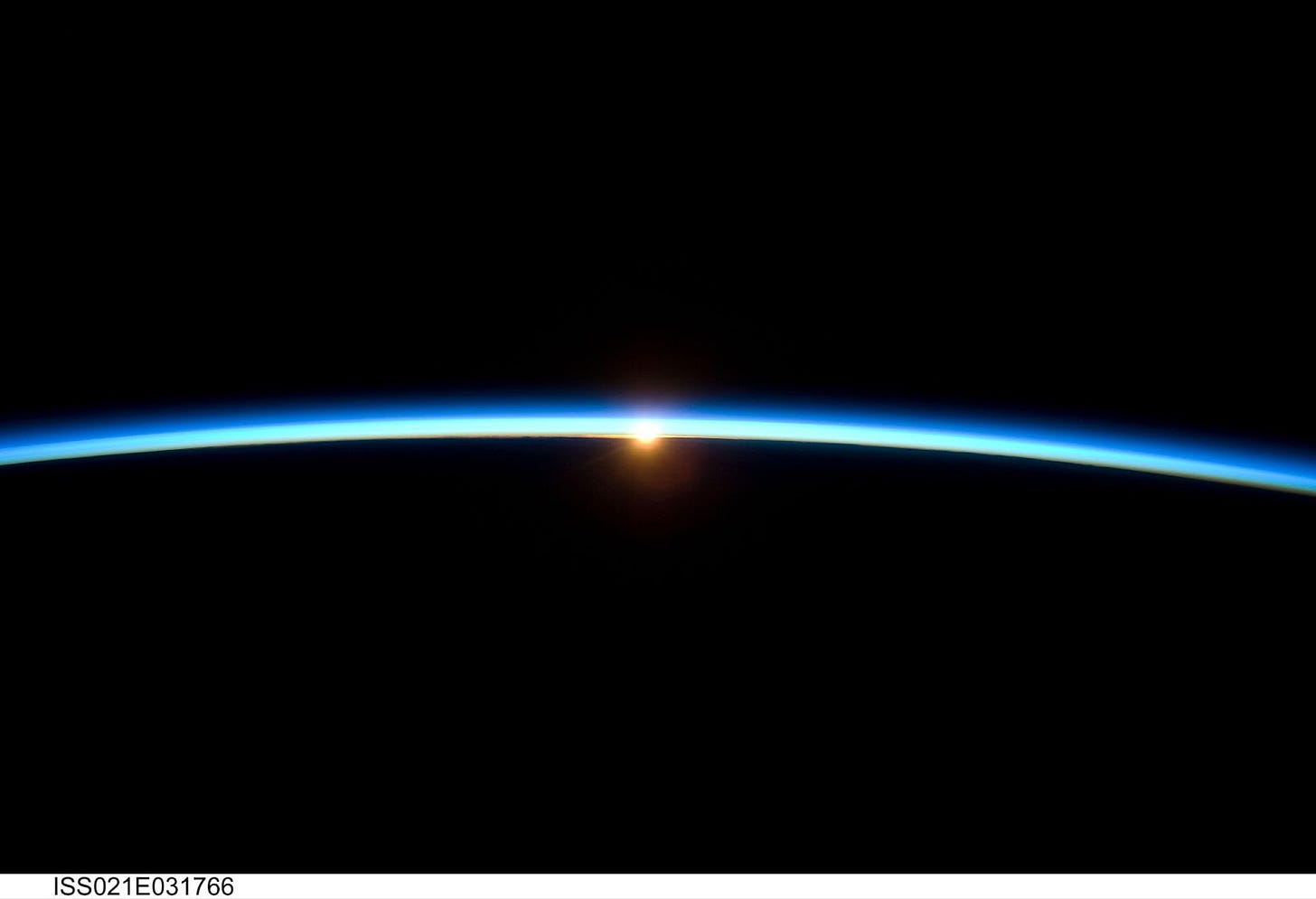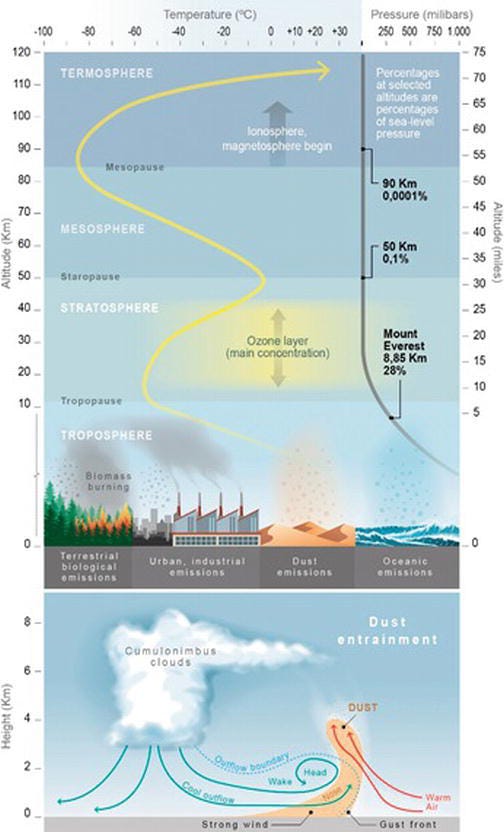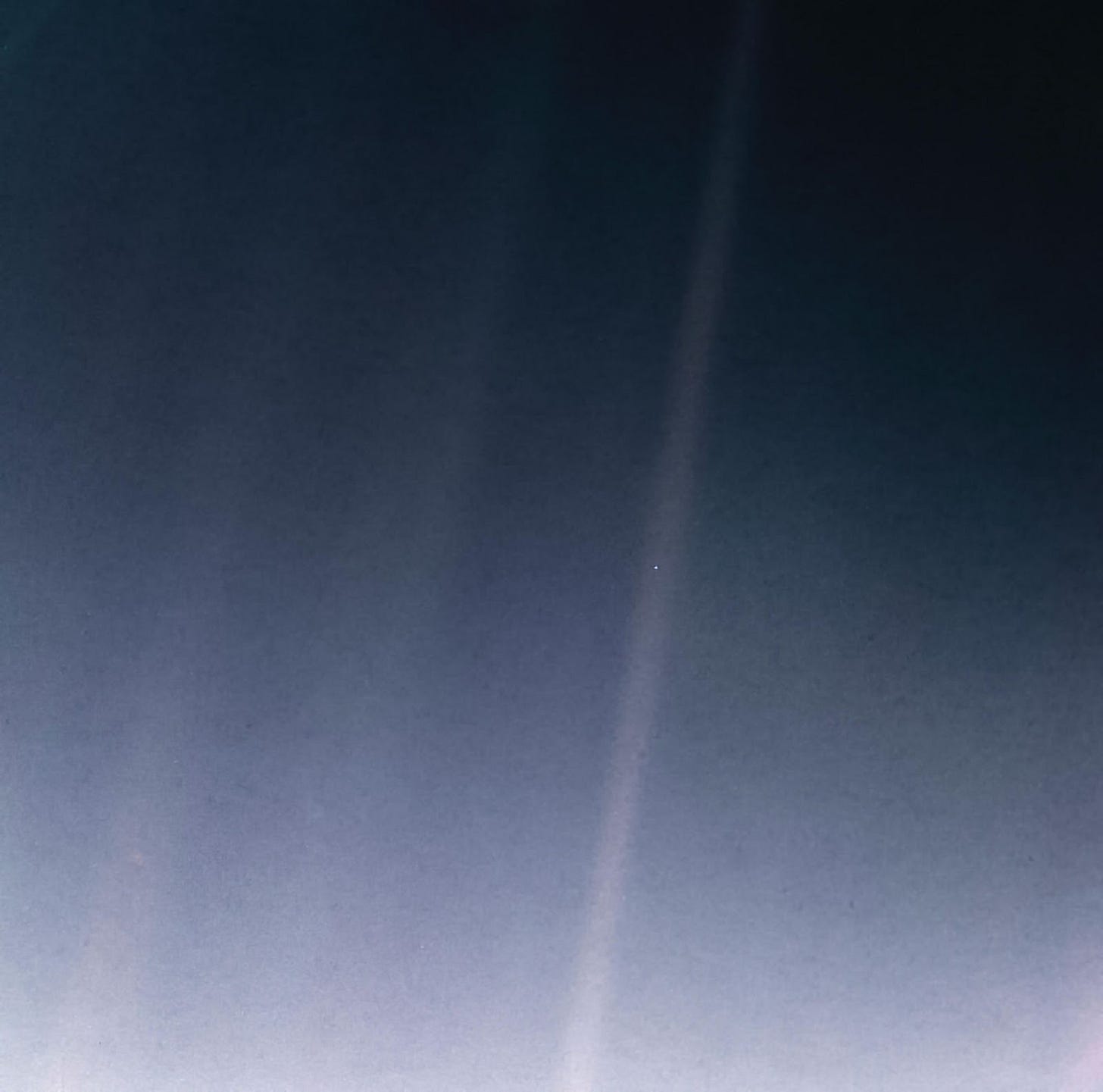Today I’m working on a course for the Ecosystem Restoration Communities and taking an eDNA course at Queen’s University for fun!
I came across this photo taken from the International Space Station, and it reminded me of how precious this small little blue planet is. That thin blue line is our atmosphere.
That thin line protects us and insulates us from the cold vacuum of space, where, unprotected, we would die. We all live in that small space. The magnetic field around the earth and our atmosphere protected us from the radiation of space and from the recent solar storm that hit us and gave us a beautiful aurora.
A thin layer of soil allows plants to grow and for all other life on land to flourish, we are all dependent on a complex process called photosynthesis. We and every creature on the planet live in that thin space between the soil and that thin cover of the atmosphere.
Few people realize just how precious this planet is, how rare the conditions for life are, and how easily we can damage life. Otherwise, we would be taking better care of all life and its interconnectedness.
We live in the Goldilocks zone of our solar system. Not too close to the sun, or it would be too hot, and not so far that it is cold. Our planet rotates at the right speed, so we have a night and a day, or one side of the planet would be cold and the other hot. Our planet is tilted a bit so that as we go around the sun, we have seasons.
Goldilocks Zone (https://en.wikipedia.org/wiki/European_Southern_Observatory)
Our planet formed after many other stars lived and died, so when our planet formed, we had all the elements for life here. Many of the heavier elements could not form without a star going supernova! When some people say we are stardust, we are. All these things make this planet livable, and that is not to be taken lightly.
Star life cycles (R.N. Bailey, CC BY 4.0 <https://creativecommons.org/licenses/by/4.0>, via Wikimedia Commons)
NASA/JPL-Caltech, Public domain, via Wikimedia Commons
I’ll leave you with this. That pale blue dot is us in the vastness of space, taken as Voyager 1 left our solar system. We are alone and far from any other planet that would sustain life. Maybe you will see just how precious this planet is and take care of the most precious thing on the planet - LIFE.
Yes Life is THE most precious thing on Earth
Not gold or platinum
Not money or any of the other things that we have put a speculative and imaginary value on
Money will not keep you alive
Every one of us will face our death
At the end of our life,
quickly or more and more, as a slow death, painful and cancerous,
We will learn the value of life
But too late
Too late
Facing your death is important. It realigns your view of life, valuing it. Instead of hiding from what will happen, we look at it deeply and find our understanding.
At some point, you look up from the me, me, me story and see the suffering of others. Maybe it is just the ones close to you, a neighbour, maybe if you open your heart more, all life becomes precious.
I can only point the direction; there is a lot of work you have to do.








Thank you for the wonderful content you share Paul. I first came across your content on youtube while researching off grid living in the Yucatan. I really enjoyed the video where you showed the progress restoring the health of the preserve you created in the yucatan. I also really enjoyed the video explaining how to make nature friendly fertilizer.
I am starting to apply some to the principles I've learned from you and others in my backyard. I just sent you a brief email through the contact form on the Resilient Ecosystem website.
“Last year, I had a life-changing experience at 90 years old. I went to space, after decades of playing an iconic science-fiction character who was exploring the universe. I thought I would experience a deep connection with the immensity around us, a deep call for endless exploration.
"I was absolutely wrong. The strongest feeling, that dominated everything else by far, was the deepest grief that I had ever experienced.
"I understood, in the clearest possible way, that we were living on a tiny oasis of life, surrounded by an immensity of death. I didn’t see infinite possibilities of worlds to explore, of adventures to have, or living creatures to connect with. I saw the deepest darkness I could have ever imagined, contrasting so starkly with the welcoming warmth of our nurturing home planet.
"This was an immensely powerful awakening for me. It filled me with sadness. I realized that we had spent decades, if not centuries, being obsessed with looking away, with looking outside. I did my share in popularizing the idea that space was the final frontier. But I had to get to space to understand that Earth is and will stay our only home. And that we have been ravaging it, relentlessly, making it uninhabitable."
-- William Shatner, actor"William Shatner, renowned for his portrayal of Captain James T. Kirk in "Star Trek," ventured into space at 90 years old aboard Blue Origin's New Shepard rocket in October 2021. Contrary to his expectations of awe and wonder, Shatner experienced profound grief during the journey. He described space as a "cold, dark, black emptiness," which starkly contrasted with Earth's vibrant life. This realization intensified his awareness of Earth's fragility and humanity's role in its degradation. Shatner's reflections align with the "overview effect," a cognitive shift reported by astronauts who view Earth from space, leading to a deeper connection with the planet and a sense of responsibility for its preservation. "
WCBE 90.5 FM